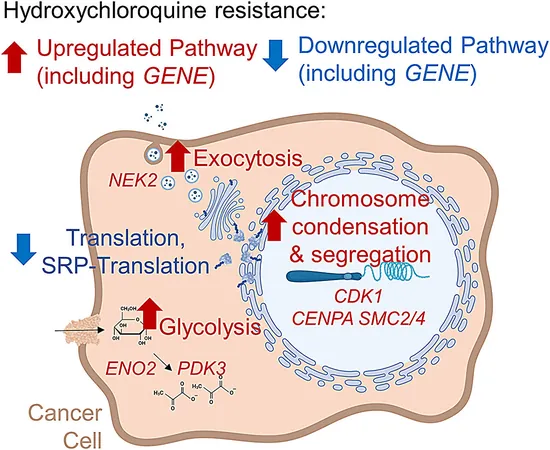
Hydroxychloroquine: The Surprising Old Drug That May Hold the Key to Advanced Cancer Treatments
2024-11-04
Author: Daniel
As the relentless search for effective cancer therapies continues, researchers are increasingly revisiting older medications that may thwart this devastating disease in innovative ways. One such medication is hydroxychloroquine, an anti-malarial drug originally developed to treat malaria, which has gained attention for its potential to combat cancer. Initially hailed for its ability to inhibit the resupply chain of resources to cancer cells, clinical trials have faced significant setbacks, primarily due to the development of drug resistance among these cells.
A groundbreaking study from a team at the Medical University of South Carolina's Hollings Cancer Center, led by Dr. Joe Delaney, published in Cell Cycle, has shed new light on the mechanics of this resistance. Contrary to earlier expectations, resistance does not arise from cancer cells restoring their capacity to recycle cellular components. Instead, the research revealed that modifications occur in the mechanisms of cell division, metabolism, and export pathways, suggesting new avenues for combination treatments to enhance the efficacy of hydroxychloroquine.
The Revival of Repurposed Drugs: A Wise Strategy?
Repurposing existing drugs for new therapies is not a novel idea. Take aspirin, for instance; initially a simple pain reliever, it has been redefined as a pivotal treatment for heart disease due to its blood-thinning properties. Similarly, thalidomide, once confined to infamy due to its notorious side effects, has found a foothold in the treatment of specific cancers and leprosy. As modern cancer therapies increasingly focus on targeting specific proteins, researchers like Delaney are advocating for a return to the broad-spectrum attack strategies offered by older medications.
Dr. Delaney explains that “focusing on single proteins can yield exceptional results in cancer treatment, yet this narrow approach significantly raises the likelihood of developing resistance.” To illustrate, imagine a hotel corridor where each door represents a potential route for cancer progression. While closing one door to block access to cancer's growth may be effective temporarily, cancer is adept at finding alternative routes when cornered. The diverse mechanisms of action found in older drugs, like hydroxychloroquine, mean they can effectively block several pathways at once, increasing the challenge for cancer cells to adapt and survive.
Hydroxychloroquine was introduced as a treatment for malaria but piqued research interest in cancer therapy in the mid-2000s, primarily due to its ability to obstruct autophagy, a crucial cellular process that enables cancer cells to thrive. This "self-eating" process allows cancer cells to recycle or discard damaged cellular materials, providing them with the necessary resources to grow and replicate uncontrollably.
The Unforeseen Resistance Mechanisms
Despite the initial optimism regarding hydroxychloroquine's potential to disrupt cancer cell autophagy, clinical outcomes have often been underwhelming. Dr. Delaney candidly notes, “We still don’t fully understand why so many clinical trials have failed. Our research aims to uncover the conditions under which hydroxychloroquine is effective or ineffective in treating cancer.”
To investigate further, Delaney's team employed a comprehensive, multi-omics approach to assess hydroxychloroquine's impact on ovarian and colorectal cancer cells. They subjected cancer cells to the drug and utilized advanced genomic screening techniques to track the cancer cells' responses to hydroxychloroquine over time. The expectation that cancer cells would adapt by modifying their autophagy pathways proved incorrect. Instead, the research showed that cells were altering their metabolic profiles, division processes, and export mechanisms—surprising revelations that underscore the complexity of cancer cell behavior.
Dr. Delaney remarked, “We had anticipated that rescuing autophagy was the primary way cancer cells escaped hydroxychloroquine’s effects. What we found was that alternative, unanticipated pathways were key to their survival.
Paving New Paths for Effective Cancer Therapies
With these insights, the Delaney Lab is poised to explore novel combination therapies that pair hydroxychloroquine with drugs targeting these newly discovered resistance mechanisms. By combining hydroxychloroquine with medications that interfere with cell division, metabolism, or export functions, researchers hope to amplify treatment success rates. Moreover, accurately diagnosing any existing defects in these pathways among cancer patients could facilitate more tailored and effective treatment plans.
"Our ultimate goal is to identify which specific patients stand to gain the most benefit, enabling us to optimize treatment outcomes,” shared Dr. Delaney.
In conclusion, the evolving understanding of how hydroxychloroquine interacts with cancer cells marks a significant step forward in the fight against cancer. By revisiting and repurposing established drugs, and combining them with cutting-edge therapies, researchers are gradually unveiling new hope for improved cancer treatments, providing a glimmer of promise in an often daunting landscape. Stay tuned as science continues to unlock the secrets of these powerful, older drugs!



 Brasil (PT)
Brasil (PT)
 Canada (EN)
Canada (EN)
 Chile (ES)
Chile (ES)
 España (ES)
España (ES)
 France (FR)
France (FR)
 Hong Kong (EN)
Hong Kong (EN)
 Italia (IT)
Italia (IT)
 日本 (JA)
日本 (JA)
 Magyarország (HU)
Magyarország (HU)
 Norge (NO)
Norge (NO)
 Polska (PL)
Polska (PL)
 Schweiz (DE)
Schweiz (DE)
 Singapore (EN)
Singapore (EN)
 Sverige (SV)
Sverige (SV)
 Suomi (FI)
Suomi (FI)
 Türkiye (TR)
Türkiye (TR)